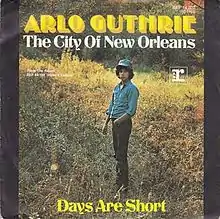City of New Orleans (song)
"City of New Orleans" is a country folk song written by Steve Goodman (and first recorded for Goodman's self-titled 1971 album), describing a train ride from Chicago to New Orleans on the Illinois Central Railroad's City of New Orleans in bittersweet and nostalgic terms.
| "City of New Orleans" | |
|---|---|
| Single by Steve Goodman | |
| from the album Steve Goodman | |
| B-side | "Would You Like to Learn to Dance?" |
| Released | 1971 |
| Recorded | 1971 |
| Genre | Folk, Country |
| Length | 3:52 |
| Label | Buddah |
| Songwriter(s) | Steve Goodman |
| Producer(s) | Kris Kristofferson, Norbert Putnam |
Goodman got the idea while traveling on the Illinois Central line for a visit to his wife's family. The song has been recorded by numerous artists both in the US and Europe, including two major hit versions: first by Arlo Guthrie in 1972, and later by Willie Nelson in 1984.
An article in the September 2017 issue of Trains magazine chronicles the writing and recording of the song and includes a biographical sketch of Steve Goodman.[1]
Arlo Guthrie version
| "The City of New Orleans" | |
|---|---|
 | |
| Single by Arlo Guthrie | |
| from the album Hobo's Lullaby | |
| B-side | "Days Are Short" |
| Released | July 1972 |
| Recorded | 1972 |
| Genre | Folk |
| Length | 4:31 |
| Label | Reprise |
| Songwriter(s) | Steve Goodman |
| Producer(s) | Lenny Waronker, John Pilla |
While at the Quiet Knight bar in Chicago, Goodman saw Arlo Guthrie, and asked to be allowed to play a song for him. Guthrie grudgingly agreed, on the condition that if Goodman bought him a beer, Guthrie would listen to him play for as long as it took to drink the beer.[2] Goodman played "City of New Orleans", which Guthrie liked enough that he asked to record it. The song was a hit for Guthrie on his 1972 album Hobo's Lullaby, reaching #4 on the Billboard Easy Listening chart and #18 on the Hot 100 chart; it would prove to be Guthrie's only top-40 hit and one of only two he would have on the Hot 100 (the other was a severely shortened and rearranged version of his magnum opus "Alice's Restaurant", which hit #97).
Gerard Cox version
| "'t Is weer voorbij die mooie zomer" | |
|---|---|
| Single by Gerard Cox | |
| B-side | "Zullen we ritselen?" |
| Released | 13 October 1973 |
| Genre | Pop |
| Length | 4:30 |
| Label | CBS Records |
| Composer(s) | Steve Goodman |
| Lyricist(s) | Gerard Cox |
| Producer(s) | Ruud Jacobs |
In 1973, Dutch singer Gerard Cox released a Dutch-language cover entitled "'t Is weer voorbij die mooie zomer" ("It's Over Again, That Beautiful Sommer"). The single reached #1 and #2 on the Dutch and Belgian record charts, respectively.
Rudi Carrell version
| "Wann wird's mal wieder richtig Sommer?" | |
|---|---|
.jpg.webp) | |
| Single by Rudi Carrell | |
| B-side | "Heul nicht" |
| Released | 1975 |
| Genre | Pop |
| Length | 4:20 |
| Label | Ariola |
| Composer(s) | Steve Goodman |
| Lyricist(s) | Thomas Woitkewitsch |
| Producer(s) | Thomas Woitkewitsch |
In 1975, Dutch singer Rudi Carrell released a German-language cover with lyrics by producer Thomas Woitkewitsch. The single, "Wann wird's mal wieder richtig Sommer?" ("When Will There be a Proper Summer Again?"), stayed on the German record charts for 14 weeks, peaking at #18. This version has been widely covered, spawning German Top-40 recordings by Creme 21 and Indira Weis.[8]
Willie Nelson version
| "City of New Orleans" | ||||
|---|---|---|---|---|
| Single by Willie Nelson | ||||
| from the album City of New Orleans | ||||
| B-side | "Why Are You Pickin' on Me" | |||
| Released | July 1984 | |||
| Recorded | October 1983 | |||
| Genre | Country | |||
| Length | 4:47 | |||
| Label | Columbia | |||
| Songwriter(s) | Steve Goodman | |||
| Producer(s) | Chips Moman | |||
| Willie Nelson singles chronology | ||||
| ||||
Steve Goodman won a posthumous Grammy Award for Best Country Song at the 27th Grammy Awards in 1985 for Willie Nelson's version, which was included on Nelson's 1984 album City of New Orleans. It reached #1 on both the Billboard Hot Country Singles chart in the United States[9] and the RPM Country Tracks chart in Canada.
Chart performance
| Chart (1984) | Peak position |
|---|---|
| US Hot Country Songs (Billboard)[10] | 1 |
| US Adult Contemporary (Billboard)[11] | 30 |
| Canadian RPM Country Tracks | 1 |
| Canadian RPM Adult Contemporary Tracks | 3 |
Creme 21 version
| "Wann wird's mal wieder richtig Sommer?" | |
|---|---|
.jpg.webp) | |
| Single by Creme 21 | |
| B-side | "Ich kann mich nicht entscheiden" "Ich will auch mit (in den Übungsraum)" |
| Released | 1996 |
| Genre | Pop rock |
| Length | 3:24 |
| Label | Epic Records |
| Composer(s) | Steve Goodman |
| Lyricist(s) | Thomas Woitkewitsch |
| Producer(s) | Jeo |
Creme 21, a pop band from Frankfurt am Main, recorded a version using Thomas Woitkewitsch's German lyrics. The cover spent 12 weeks on the German record charts, peaking at #36.[8]
Indira Weis version
| "Wann wird's mal wieder richtig Sommer?" | |
|---|---|
 | |
| Single by Indira | |
| Released | September 4, 2009 |
| Recorded | 2009 |
| Genre | Pop |
| Length | 23:30 |
| Label | UCA |
| Composer(s) | Steve Goodman |
| Lyricist(s) | Thomas Woitkewitsch |
| Producer(s) | Andreas Habermeyer Ulrich Fischer Harald Reitinger for Beat Power Music |
| Music video | |
| "Wann wird’s mal wieder richtig Sommer?" on YouTube | |
"Wann wird’s mal wieder richtig Sommer?" (German: When will there be a proper summer again?) is the first single of Indira Weis, who got famous in the German multicultural R&B group Bro'Sis. Together with the movie producer Andreas Habermeyer she covered the hit from Rudi Carrell for the Oktoberfest 2009 in Munich. The EP was released September 4, 2009.
The original music video for "Wann wird’s mal wieder richtig Sommer?" was directed and produced in Berlin, August 2009. The video premiered September 4, 2009.[12]
Indira performed the song the first time in front of the Rotes Rathaus in Berlin September 9, 2009.[13]
Track listing
| No. | Title | Length |
|---|---|---|
| 1. | "Wann Wird's Mal Wieder Richtig Sommer (Original Party Mix)" | 4:07 |
| 2. | "Wann Wird's Mal Wieder Richtig Sommer (Sommer Mix)" | 3:41 |
| 3. | "Wann Wird's Mal Wieder Richtig Sommer (English Party Mix)" | 4:10 |
| 4. | "Wann Wird's Mal Wieder Richtig Sommer (English Summer Mix)" | 3:37 |
| 5. | "Wann Wird's Mal Wieder Richtig Sommer (Karaoke Party Mix)" | 4:14 |
| 6. | "Wann Wird's Mal Wieder Richtig Sommer (Karaoke Sommer Mix)" | 3:41 |
Other cover versions
- The original English version has been widely covered, including by John Denver (in 1971), The Seldom Scene (in 1972), Johnny Cash (in 1973), and Judy Collins (in 1975).
- German lyrics have been written for Goodman's original melody at least three times. The first of these was Austrian singer Jonny Hill's version, released in 1973 as "Ein Zug genannt City of New Orleans". A second set of German-language lyrics, closely following Cox's Dutch version, was used in a 1974 release by Ronny, "Einmal vergeht der schönste Sommer". Thomas Woitkewitsch's 1975 lyrics have been used by a number of artists, including Rudi Carrell in 1973, Creme 21 in 1996, and Indira Weis in 2009 (for all of which see above),[8] as well as by Dieter Thomas Kuhn in 1995,[8] Die Lollipops in 2001, and Leonard in 2012.
- In 1972, American singer Joe Dassin recorded a French version, "Salut les Amoureux" (Hello Lovers),[14] re-using the melody but changing the lyrics completely. Dassin sings the last line of the chorus a fourth lower than the original on a conventional IV-V-I chord progression. Damien Poyard recorded this version on his 2015 CD "Un parfum de folie" (A scent of madness). Canadian Roch Voisine recorded an English/French version which appears his album Americana.
- Gerard Cox's Dutch version has been parodied a number of times, including by Cox himself in 1973 and by Farce Majeure in 1986 (both times as "'t Is weer voorbij die mooie winter"), and by Wilfred Genee and Johan Derksen in 2012 (as "Nederland is helemaal oranje", a song about the Netherlands national football team recorded specially for UEFA Euro 2012). Cox's version has also seen a number of straight covers, including a 2019 version by Dries Roelvink and a 2020 single by Harten.
- Yoram Gaon recorded a Hebrew version in the seventies called "Hello Wonderful Country" (שלום לך ארץ נהדרת). The lyrics, written by Ilan Goldhirsch, describe the beauty of Israel.
- Juha Vainio wrote Finnish lyrics under the title "Hyvää huomenta Suomi" ("Good morning Finland"), which was a domestic hit for the band Karma in 1976 and Matti Esko in 1989. The lyrics describe a semi-trailer truck driver moving cargo over night to his destination.
- Norwegian folk singer Øystein Sunde recorded a version, entitled "Liten Og Grønn" ("Tiny and Green") for his 1981 album Barkebille Boogie. The song is about the life of a Widerøe Twin Otter airplane.
- Čikāgas piecīši recorded a Latvian version, "Pazudušais dēls".
- Icelandic singer Björgvin Halldórsson recorded a version with his band Brimkló for the 1976 album Rock 'n' roll, öll mín bestu ár. The Icelandic lyrics, "Síðasta sjóferðin", were written by Þorsteinn Eggertsson.
- A Slovenian versin is covered by music artist Tomaž Domicelj. The song, "Vlak na jug" ("Southbound Train"), was released on the 1979 album 48.
References
- Sanders, Craig. "Writing of 'City of New Orleans'". Trains 77(9):34-39.
- Central, Spotlight (15 November 2016). ""Running Down the Road" Arlo Guthrie LIVE! at The Grunin Center". Medium. Retrieved 1 February 2018.
- "Image : RPM Weekly - Library and Archives Canada". Bac-lac.gc.ca. Retrieved 2016-11-17.
- "Image : RPM Weekly - Library and Archives Canada". Bac-lac.gc.ca. Retrieved 2016-11-17.
- "Arlo Guthrie Chart History (Hot 100)". Billboard.
- Whitburn, Joel (2002). Top Adult Contemporary: 1961-2001. Record Research. p. 109.
- "Top 100 Hits of 1972/Top 100 Songs of 1972". Musicoutfitters.com. Archived from the original on 2017-04-27. Retrieved 2016-11-17.
- "Wetter: Wann wird's mal wieder richtig Sommer?". Die Zeit. Hamburg. 2011-08-07. ISSN 0044-2070. Retrieved 2021-01-05.
- Whitburn, Joel (2004). The Billboard Book Of Top 40 Country Hits: 1944-2006, Second edition. Record Research. p. 245.
- "Willie Nelson Chart History (Hot Country Songs)". Billboard.
- "Willie Nelson Chart History (Adult Contemporary)". Billboard.
- "Indira - Videoclip zum Wiesenhit auf dem Oktoberfest - Musik" (in German). Bild.de. 2009-09-04. Retrieved 2012-03-13.
- "München · Sonnenschein auf der Wiesn - Ex-"Bro'Sis"-Star Indira Weis will den Wiesn-Hit landen". Wochenanzeiger.de. 2009-08-20. Retrieved 2012-03-13.
- "Track of the Day: 'Salut Les Amoureux' by Joe Dassin". The Atlantic. 2016-10-22. Retrieved 2017-11-30.
External links
- Original lyrics at the Wayback Machine (archived October 20, 2006)
- Arlo Guthrie cover lyric version at the Wayback Machine (archived November 21, 2006)
- Classic Tracks: Arlo Guthrie's "City of New Orleans"